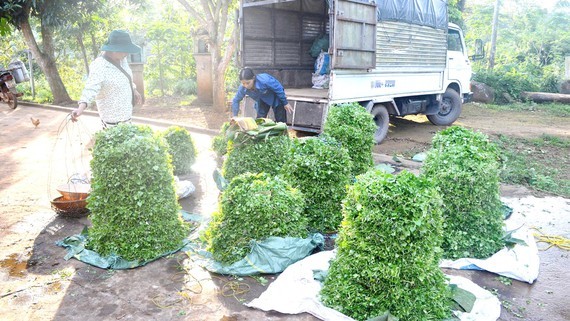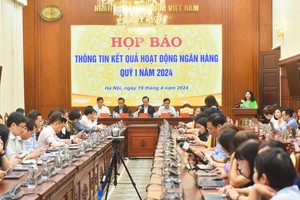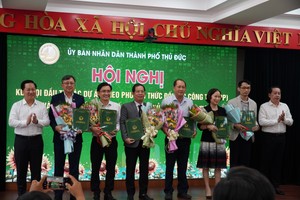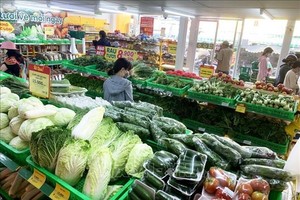
Tra Que Village in Hoi An City in Quang Nam Province has 18 hectares of vegetable-growing area with 200 farming households. The vegetable village provides the market around 1,000 tons of vegetables and fruit. Besides safety, Tra Que vegetables are famous for their special fragrance so sometime supply cannot meet demand.
Mr. Nguyen Sung, a farmer in Tra Que Hamlet, said that since the outburst of the Covid-19, fewer and fewer tourists go to Hoi An City so restaurants have halted services, some supermarkets have also reduced the buying volume of vegetables, causing vegetables to consume slowly. The prices of vegetables also dropped by 30 percent compared to normal days. Some households have sold vegetables on social networking sites and applied home delivery service. Some other households have opened vegetable stores at markets to sell their produce.
According to Mrs. Cao Thi Dong, who has grown vegetables for more than 40 years in Tra Que Village, besides maintaining cultivating of vegetables that require high techniques to provide for restaurants and hotels when the disease is over, farmers have also switched to cultivate some vegetables that are easy to grow and in demand of people.
‘I will try to sell all the lettuce, basil, water mint, scallion, and coriander that are often distributed to hotels and restaurants, then switch to grow water morning glory and star gooseberry to sell to local people,’ said Mrs. Dong.
Ms. Nguyen Thi Van, Director of the Department of Economics of Hoi An City, said that the disease caused many difficulties but also created an opportunity for local farmers to restructure vegetable cultivation, seeds, cultivation methods, and market in the direction of improving the value chain and the product quality and maintaining the brand of Tra Que vegetables.
In Quang Tri Province, to consume more than 10,000 tons of cassava starch and tens of tons of bananas stagnant because they could not export to China due to the Covid-19 pandemic, enterprises and traders in the province have looked for distribution channels to export to Thailand and Laos. Ms. Nguyen Thi Vy, a trader in Tan Long banana market in Huong Hoa District in Quang Tri Province, said that the export of bananas to China has been temporarily halted but traders still buy bananas for farmers at VND3,000-VND5,000 per kilogram, down VND2,000-VND3,000 per kilogram compared to before the lunar New Year, to distribute in Hanoi, Da Nang, and Ho Chi Minh City or export to Laos and Thailand.
Mr. Tran Thanh Hien, Deputy Director of the Department of Agriculture and Rural Development of Quang Tri Province, said that local seafood products also faced several difficulties as the Chinese market paused imports. Currently, anchovies, the key export product of Quang Tri Province, fetched from VND14,000-VND17,000 per kilogram, down VND5,000-VND7,000 per kilogram. Along with supporting farmers in changing plant varieties, building production models adapted to drought conditions, the department also proposed the provincial People’s Committee to create conditions for agro-forestry-aquatic product processing enterprises to access capital sources.
Mr. Nguyen Sung, a farmer in Tra Que Hamlet, said that since the outburst of the Covid-19, fewer and fewer tourists go to Hoi An City so restaurants have halted services, some supermarkets have also reduced the buying volume of vegetables, causing vegetables to consume slowly. The prices of vegetables also dropped by 30 percent compared to normal days. Some households have sold vegetables on social networking sites and applied home delivery service. Some other households have opened vegetable stores at markets to sell their produce.
According to Mrs. Cao Thi Dong, who has grown vegetables for more than 40 years in Tra Que Village, besides maintaining cultivating of vegetables that require high techniques to provide for restaurants and hotels when the disease is over, farmers have also switched to cultivate some vegetables that are easy to grow and in demand of people.
‘I will try to sell all the lettuce, basil, water mint, scallion, and coriander that are often distributed to hotels and restaurants, then switch to grow water morning glory and star gooseberry to sell to local people,’ said Mrs. Dong.
Ms. Nguyen Thi Van, Director of the Department of Economics of Hoi An City, said that the disease caused many difficulties but also created an opportunity for local farmers to restructure vegetable cultivation, seeds, cultivation methods, and market in the direction of improving the value chain and the product quality and maintaining the brand of Tra Que vegetables.
In Quang Tri Province, to consume more than 10,000 tons of cassava starch and tens of tons of bananas stagnant because they could not export to China due to the Covid-19 pandemic, enterprises and traders in the province have looked for distribution channels to export to Thailand and Laos. Ms. Nguyen Thi Vy, a trader in Tan Long banana market in Huong Hoa District in Quang Tri Province, said that the export of bananas to China has been temporarily halted but traders still buy bananas for farmers at VND3,000-VND5,000 per kilogram, down VND2,000-VND3,000 per kilogram compared to before the lunar New Year, to distribute in Hanoi, Da Nang, and Ho Chi Minh City or export to Laos and Thailand.
Mr. Tran Thanh Hien, Deputy Director of the Department of Agriculture and Rural Development of Quang Tri Province, said that local seafood products also faced several difficulties as the Chinese market paused imports. Currently, anchovies, the key export product of Quang Tri Province, fetched from VND14,000-VND17,000 per kilogram, down VND5,000-VND7,000 per kilogram. Along with supporting farmers in changing plant varieties, building production models adapted to drought conditions, the department also proposed the provincial People’s Committee to create conditions for agro-forestry-aquatic product processing enterprises to access capital sources.
























